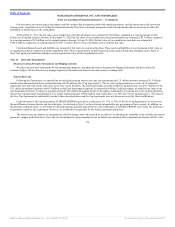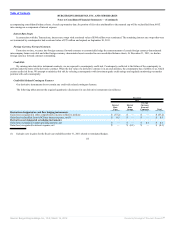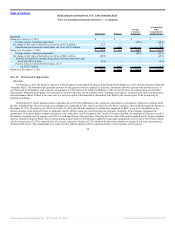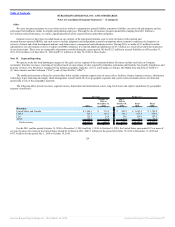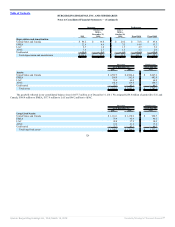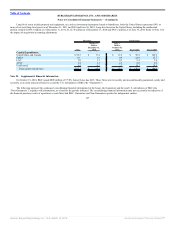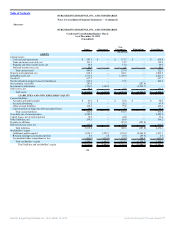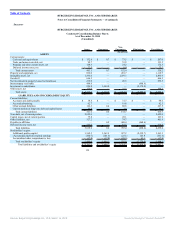Burger King 2011 Annual Report Download - page 124
Download and view the complete annual report
Please find page 124 of the 2011 Burger King annual report below. You can navigate through the pages in the report by either clicking on the pages listed below, or by using the keyword search tool below to find specific information within the annual report.
Table of Contents
BURGER KING HOLDINGS, INC. AND SUBSIDIARIES
Notes to Consolidated Financial Statements — (Continued)
commitments are not subject to any time limit and as of December 31, 2011, we estimate it will take approximately 14 years for these purchase commitments to
be completed. In the event of early termination of these arrangements, we may be required to make termination payments that could be material to our financial
position, results of operations and cash flows.
During 2011, we entered into a five-year contract with a vendor to supply Company and franchise restaurants in LAC with soft drink products on an
exclusive basis and to supply Company and franchise restaurants in the United States with food products. We received upfront fees and contributions to our
marketing funds in connection with this agreement and may receive additional fees in the future in connection with the achievement of certain milestones. We
recognize the fees earned in connection with milestone achievement as franchise and property revenue when it is reasonably estimable and probable. Upfront fees
are amortized as franchise and property revenue over the term of the contract. As of December 31, 2011, the deferred revenue associated with this contract
totaled $4.5 million. Revenue recognized in connection with this arrangement was not material in 2011.
As of December 31, 2011, we had $6.1 million in aggregate contractual obligations for the year ended December 31, 2011 with vendors providing
information technology and telecommunication services under multiple arrangements. These contracts extend up to four years with a termination fee ranging
from $0.3 million to $2.0 million during those years. We also have separate arrangements for telecommunication services with an aggregate contractual
obligation of $2.8 million over the next two years with no early termination fee.
We also enter into commitments to purchase advertising. As of December 31, 2011, commitments to purchase advertising totaled $104.3 million and run
through September 2012.
Litigation
On July 30, 2008, BKC was sued by four Florida franchisees over its decision to mandate extended operating hours in the United States. The plaintiffs
sought damages, declaratory relief and injunctive relief. The court dismissed the plaintiffs’ original complaint in November 2008. In December 2008, the
plaintiffs filed an amended complaint. In August 2010, the court entered an order reaffirming the legal bases for dismissal of the original complaint, again
holding that BKC had the authority under its franchise agreements to mandate extended operating hours. In February 2012, the plaintiffs filed a notice of
voluntary dismissal with prejudice without either side paying any financial compensation nor any change to BKC’s extended hours policy.
On September 10, 2008, a class action lawsuit was filed against the Company in the United States District Court for the Northern District of California.
The complaint alleged that all 96 Burger King restaurants in California leased by the Company and operated by franchisees violate accessibility requirements
under federal and state law. In September 2009, the court issued a decision on the plaintiffs’ motion for class certification. In its decision, the court limited the
class action to the 10 restaurants visited by the named plaintiffs, with a separate class of plaintiffs for each of the 10 restaurants and 10 separate trials. In
March 2010, the Company agreed to settle the lawsuit with respect to the 10 restaurants and, in July 2010, the court gave final approval to the settlement. In
February 2011, a class action lawsuit was filed with respect to the other 86 restaurants. The plaintiffs sought injunctive relief, statutory damages, attorneys’ fees
and costs. In January 2012, BKC agreed to settle the lawsuit. The parties are finalizing the terms of the proposed settlement which will be submitted to the court
for approval.
From time to time, the Company is involved in other legal proceedings arising in the ordinary course of business relating to matters including, but not
limited to, disputes with franchisees, suppliers, employees and customers, as well as disputes over our intellectual property.
123
Source: Burger King Holdings Inc, 10-K, March 14, 2012 Powered by Morningstar® Document Research℠



